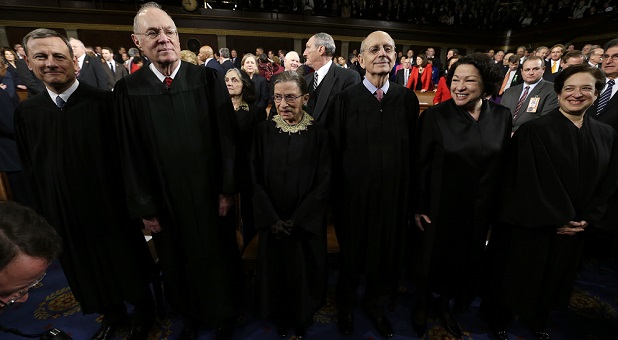This One Case Could Re-Open the Supreme Court’s Gay ‘Marriage’ Decision
Five Supreme Court justices — and a disturbing number of Republican presidential contenders — say that the issue of gay “marriage” is settled, but a pro-family law firm says not so fast. An Alabama case involving same-sex marriage could bring the issue back to legal life by asking one question: What about couples who were “married” before gay “marriage” became legal? In 2011, Paul Hard and David Fancher went through a same-sex marriage ceremony in Massachusetts and returned to live in Alabama. On August 1, 2011, David Fancher was killed in an accident involving a UPS truck. UPS paid a settlement to the Fancher estate, but Hard was not allowed to collect a spousal share of the estate because, according to the executor, Alabama law did not recognize same-sex marriage; Hard was therefore not a spouse. The Southern Poverty Law Center filed a lawsuit against the State of Alabama to have Alabama’s Sanctity of Marriage Amendment declared unconstitutional on Hand’s behalf. But then Fancher’s blood relatives got involved. Patricia Fancher, the mother of David Fancher, asked the Foundation for Moral Law to intervene in the case. The Foundation for Moral Law is a Montgomery-based legal foundation that defends the First Amendment and says that judges have the duty to interpret the Constitution as written. It was founded by current Alabama Supreme Court Chief Justice Roy Moore. Although Fancher had a loving relationship with her son, she said she did not want his name used to advance the cause of same-sex “marriage.” In October 2014 Hard, Fancher, and the State of Alabama each filed a motion for summary judgment, which Judge Watkins put on hold until the U.S. Supreme Court decides the issue. After the Supreme Court struck down state marriage protection amendments, Hard asked the District Court to rule on his motion for summary judgment. But in a motion filed last Wednesday, the Foundation raised the question of whether the Supreme Court’s same-sex marriage decision is retroactive to past relationships, especially as to those which ended years, not months ago. “The issue is not whether someone may marry a member of the same sex today,” FML Executive Director Matthew Kidd stated. “The issue is whether a court may or should look back four years and recognize a marriage that was not legally valid” at that time. He added that, “if the marriage is recognized, it will only cause further economic harm to a family which has already lost one its own. And if recognized, this man will be awarded an entire spousal share of the wrongful death proceeds, which would be unjust even under normal circumstances — considering the two were ‘married’ less than three months.” Foundation President Kayla Moore added, “It is outrageous that five unelected lawyers on the U.S. Supreme Court think they can invalidate a constitutional amendment adopted by 81 percentof Alabama voters in 2006, on the flimsy ground that violates a so-called ‘right’ found nowhere in the Constitution. It adds insult to injury to contend that this so-called ‘right’ should be applied retroactively to matters that should have been settled long ago.”














































